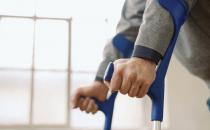Losing weight safely
If you’re overweight and want to shift some of the excess, it's important to set yourself a realistic, achievable target. The best way to lose weight is to make some changes to both your diet and the amount of exercise that you do.
This article explains how you can lose weight safely and effectively.
Get active
Follow a healthy, well-balanced diet
Improve your eating habits
Set realistic goals
Don't be tempted to crash diet
Seek support
Reward yourself
Action points
Get active
The best way to lose excess weight is to increase your activity and eat smaller portions at meal times. The UK Department of Health recommends that you do at least 30 minutes of moderate exercise on five or more days a week. However, many people need to do more than this, for example if you’re overweight or obese, or have been obese and lost weight and are trying to maintain this. Moderate exercise should make you feel warmer and a little out of breath.
Choose activities that you enjoy and that you can easily include in your lifestyle. Below are a few simple suggestions on ways to build exercise into your daily life.
- Use stairs instead of taking lifts or escalators.
- Walk or cycle short journeys – for example do the school run on foot instead of taking the car.
- Take a walk during your lunch break.
- Go for walks or bike rides at weekends.
Follow a healthy, well-balanced diet
To help lose excess weight you’ll need to reduce how many calories you eat. This may not always mean eating less food, it might just mean choosing different types of food. Your GP or a dietitian can help you put together a healthy eating plan. Below are a few ideas to get you started.
- Include starchy foods such as bread, potatoes, rice or pasta at every meal.
- Eat plenty of fresh fruit and vegetables.
- Use less butter, margarine and vegetable oils.
- Choose low-fat varieties of foods, such as low-fat spreads and leaner cuts of meat.
- Replace snacks such as chocolate, biscuits and crisps with healthier alternatives, such as fruit.
- Instead of frying or roasting food, boil, poach, grill, steam or microwave it.
Improve your eating habits
If you’re sticking to a healthy diet, don’t sabotage your efforts to lose weight with unnecessary snacking on unhealthy foods between meals. Below are a few points to help keep your weight-loss plan on track.
- Eat three regular meals a day and healthy snacks such as fruit if you’re hungry.
- Ensure you have a good breakfast.
- Only eat when you’re hungry.
- Eat slowly, chewing every mouthful thoroughly, and stop eating when you start to feel full.
- Don't feel guilty about leaving food on your plate.
Set realistic goals
It’s important to decide on small, practical changes that you feel comfortable with and that you’ll be able to stick to. For example, don’t feel you have to cut out all the foods that you enjoy from your new eating plan – you’ll only crave them all the more if you do that. Instead, make sure you only eat them now and again for a treat. Remember, there is no quick-fix answer to long-term weight loss – it takes time. Aim to lose no more than 0.5 to 1kg (1 to 2lb) every week.
You may find it motivating to weigh yourself once a week and plot a graph so that you can monitor your progress. However, try not to focus too heavily on how much weight you have lost each week but rather on how you feel. Look for other positive changes as a result of your new healthy diet, such as feeling more toned or having more energy. And remember that eating a healthy diet will also reduce your risk of heart disease and certain cancers.
When you first start to cut down on calories you’ll lose weight quite rapidly. This will be mostly water and glycogen (a type of energy stored in your liver and muscles) as well as some fat. The rate of your weight loss will then slow down, but the good news is that the proportion of the weight you lose that is accounted for by fat will increase.
Don't be tempted to crash diet
Slow, steady weight loss is more likely to last than dramatic weight changes. When you lose weight, you actually lose lean tissue (muscle) as well as body fat. Crash diets, where you vastly restrict how much you eat, can harm your health because you lose more lean body tissue and less fat. Your body's response to this is to slow down how fast it works so you burn fewer calories. This is the reason why the weight piles back on quickly once you finish crash dieting.
Seek support
It's helpful to get support from family or friends when you’re trying to lose weight. Arrange activities with them, such as walking or cycling. Alternatively, join a local slimming group for some moral support.
Reward yourself
Remember to give yourself a reward when you meet your targets. This could be anything you enjoy – a beauty treatment, a trip to the cinema or even just an evening in with your feet up.
Action points
- Set yourself a realistic goal for how much weight you want to lose.
- Draw up a healthy eating plan – if you need advice, ask your GP or a dietitian.
- Include physical activity as part of your regular daily routine.
- Keep going – losing weight can be a slow process but it’s worth persevering.
- Make losing weight fun – exercise with friends and family, and reward yourself if you achieve your goals.
Further information
- Food Standards Agency Agencia de normas para alimentos) www.eatwell.gov.uk
- Beat (formerly the Eating Disorders Association) 0845 634 1414 /www.b-eat.co.uk
- Weightwise / www.bdaweightwise.com
Sources
- Be active, be healthy: A plan for getting the nation moving. Department of Health, 2009. www.dh.gov.uk
- Obesity. Food Standards Agency. www.eatwell.gov.uk, accessed 20 July 2010
- Getting active. Food Standards Agency. www.eatwell.gov.uk, accessed 20 July 2010
- Ask a dietitian. The British Dietetic Association. www.bdaweightwise.com, accessed 20 July 2010
- Eating well. Your weight wise plan. The British Dietetic Association. www.bdaweightwise.com, accessed 20 July 2010
- So you want to lose weight...for good. British Heart Foundation, 2009. www.bhf.org.uk
















